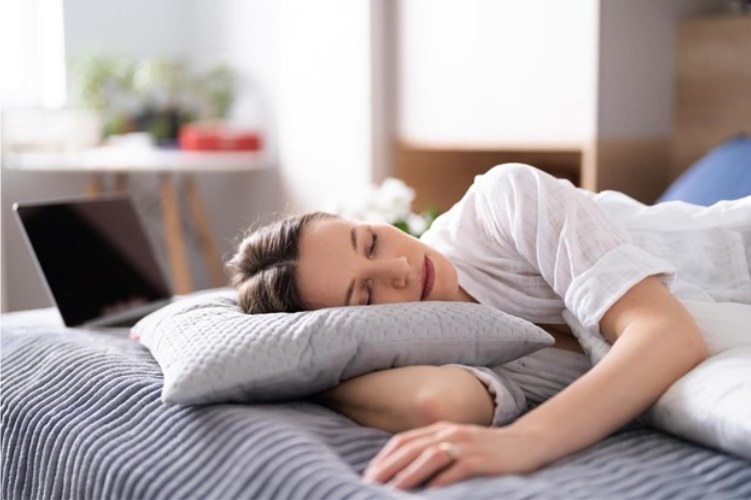Table of Contents
What Is Circadian Rhythm?
The human body has its internal clock, sometimes called the master clock. It is located in the hypothalamus and receives signals directly from the eyes. Light changes trigger the production of the hormone melatonin, which is responsible for regulating the body’s rhythm. The circadian cycle works in tandem with the homeostatic sleep drive, which regulates sleep and wakefulness.
Our circadian rhythm is controlled by external cues, which include light, temperature, noise, physical activity, and social interactions. These cues cause us to experience different patterns of sleep and wakefulness. Many of the same factors that affect the body’s internal rhythm are responsible for triggering the body’s natural biological clocks. And these internal clocks are under the guidance of the master clock. The more irregular the rhythms become, the more the human body adapts to these changes.
The external environment has a profound effect on circadian rhythms. It includes light, ingestion, temperature, noise, and physical activity. The clocks of animals that have developed a circadian rhythm are synchronized with the earth’s rotation. These daily adjustments can be detrimental to mental health, and can even lead to depression or other chronic diseases. There are some simple ways to regulate our circadian rhythms, and some of these can even be learned by practicing regular sleep habits.
How Does The Circadian Rhythm Work?
Your body’s internal clock is known as the circadian system. The timing of your sleep and wake time is affected by several factors, including light and temperature. For example, a sunny day may make you want to stay awake, while a dark day may make you want to hibernate. As your body adapts to the changes in light and darkness, the circadian system will be more in tune with your needs.
Your circadian rhythm is a natural cycle that occurs every 24 hours. Your body’s biological clock is triggered by signals in your environment and natural factors within your body. The master clock can malfunction if it’s not aligned with the day-night cycle. A disordered circadian rhythm has been associated with diabetes, obesity, and other disorders. For this reason, it’s important to understand how your internal clock works.
Circadian rhythms are caused by changes in the Sun and its intensity. It also responds to external cues, such as light and heat, and social interactions. However, our body’s internal clock is highly sensitive to these cues, so it’s essential to know when to sleep, wake up, and eat. Because of the high importance of the Sun in our lives, our bodies have circadian rhythms as well.
How Does Circadian Rhythm Work For The Babies?
The Circadian Rhythm in Babies research study is a prospective cohort study that will follow pregnant women from the second trimester until delivery. The infants will be followed until they are six months old or older. The research will have two phases: the first phase will follow pregnant women from 2019 to 2020, and the second phase will follow infants until they reach twelve months of age. The data collection in both phases will be done during the second trimester, which is around 28 to 40 weeks, and the third will occur after delivery. The questionnaires will be based on validated measures of sleep, physical activity, and stress.
The circadian rhythm is regulated by a body’s internal clock. This internal clock regulates the body’s alertness, hunger, and sleep cycles. Although the babies do not fully understand the mechanism behind this timing system, there are environmental cues that can influence the baby’s internal clock. Exposure to light during the day promotes the development of this circadian rhythm. The longer the light, the better, and the less likely your baby will be to develop problems related to its waking and sleeping schedules.
How Does Circadian Rhythm Work For The Kids Or Teens?
While primary school children are naturally tired and look forward to bedtime from seven to eight o’clock, adolescents often struggle to fall asleep and stay asleep at the same time. The internal body clock in teenagers is set to a different time than that of their parents, which can affect their sleeping patterns. Here are some tips to help your teen sleep well at night: The first step is to understand your child’s internal body clock.
The second step to helping your child get a restful sleep is recognizing when your child’s circadian rhythm is shifting. This shift in body clock is especially important in teens. This is because they have trouble falling asleep before 11:00 p.m. and often wake up later than they would like. Also, early mornings and early bedtimes can lead to sleep deprivation, so your teen should make sure that they get at least nine hours of sleep each night.
The last step is to help your teen establish a healthy sleep pattern. After all, sleep is essential for good health and a happy lifestyle. Even if your teenager is a night owl, it doesn’t mean they don’t need to get up at 5 a.m. While adjusting to the changes in their body clock, it’s still essential that you help them get a restful night’s sleep.

How Does Circadian Rhythm Work For Adults?
Circadian Rhythm in Adults is an essential component of the sleep-wake cycle. It helps regulate your energy levels throughout the day. It is the most influential cue for regulating your body’s rhythm. Those who wake up later than normal are more likely to experience circadian rhythm delay than those who wake up earlier. To make sure that you have a healthy circadian rhythm, it is important to know the factors that influence your daily routine.
A delayed sleep/wake cycle, also known as shift work disorder, is a common problem associated with adults with ADHD. When Process-C pushes Process-S, the result is a delayed sleep propensity. Those who are not able to restore their sleep propensity may suffer from physical and mental complaints. To combat the problem, individuals should consider medication that delays the rhythm. The most effective treatment options for this disorder include lifestyle modifications and research.
Circadian Rhythm And Biological Clock
Many people wonder: is a Circadian Rhythm the same as a biological clock? Well, it is. The two share the same function, which is to regulate sleep and wakefulness. These biological clocks allow living organisms to adapt to a 24-hour cycle. But are they the same thing? If so, the answer is yes. A biological clock is a collection of molecules and cells that regulate the sleep-wake cycle. The function of a circadian rhythm is to keep the body in balance by controlling the timing of certain bodily processes. In humans, this system is important for maintaining homeostasis and regulating biological processes. It is also involved in our mental health and can influence our risk of neurodegenerative diseases and psychiatric disorders.
Lastly
The Circadian Rhythm is a natural sleep-wake cycle that allows humans to sleep and wake at the same time. To maintain a healthy circadian rhythm, it is necessary to get the right amount of light and darkness during the right time of day.

